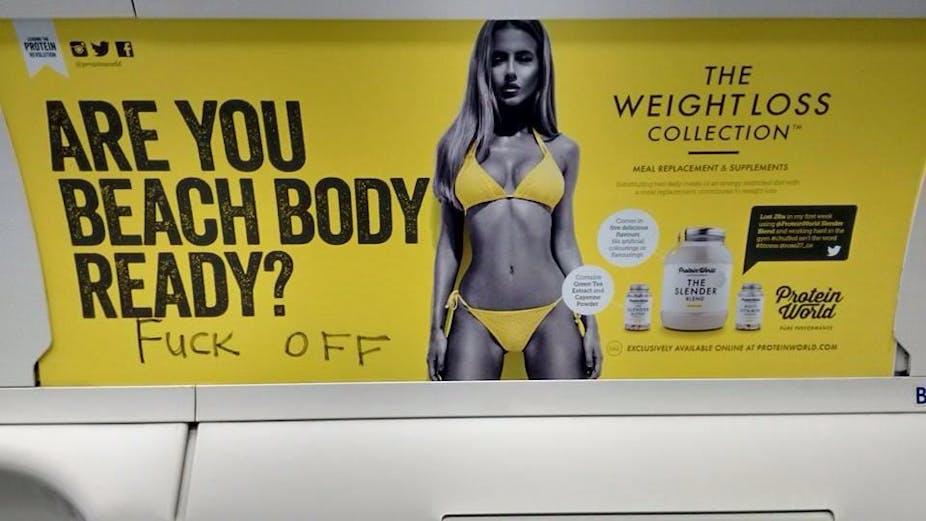In the 1980s the Beverley Hills Diet recommended eating only fruit so that “the more time you spend on the toilet the better” and was described as the mass marketing of an eating disorder. At around the same time the Barbie doll was criticised as unrealistic and unhealthy and the use of unnatural catwalk models was held as contributing to the rise of eating disorders.
Yet here we are, 35 years later, with a “beach body” advert for protein supplements suggesting that “substituting two daily meals of an energy restricted diet with a meal replacement contributes to weight loss” alongside yet another unrealistic image of a woman that can only be achieved through starvation.
Surely we have moved on by now? And surely some of the evidence from all those tirelessly produced research studies and academic papers showing the negative impact of media images on our body image has got out there to make a difference to how people think?
Well thanks to the bikini terrorists – the people who have hijacked the ad and made their own messages about body confidence (spawning an #eachbodysready hashtag) – it would seem that it has. And even if the manufacturers pushing the magic pills haven’t woken up to the modern world, the women, men and even children lodging their protest in both the virtual and real world indicate that things have changed and we are no longer prepared to be manipulated in this way.
The feminist reaction:
Corporate pile in:
Alternative takes:
Men too:

So what is so wrong with this particular advertising campaign? And why has it created such a stir in the past few days?
We currently live in a world of food trapped between two evils. On one hand, we have the problem of eating disorders such as anorexia and bulimia which have the highest mortality rate of any mental health problem. And on the other, we have the rise in obesity which is linked to a host of health problems and shortens life expectancy. The solution to these problems is three-fold – and this advert violates each of them in a spectacular way.
1: Eat well – a PR’s worst nightmare
Obesity will be neither prevented nor cured by “cutting out carbs”, “a zero-fat diet”, “meal substitutes” or any fad diet that the diet industry has to offer. Eating well is the solution and this simply means a diet high in fruit and vegetables and everything in moderation.
It’s not very marketable and comes with no great catchphrase. In fact it’s the PR company’s worst nightmare. But it prevents the rebound effects of diets which are unsustainable and helps food become one part of life rather than its focus. “Eat to live” not “Live to Eat” should be the goal. A protein pill in a jar is not eating well.
2: Be active – boost esteem
Walking, running, playing sport, doing exercise or just not sitting have short and long effects on both physical and mental health. Improved fitness does wonders for heart disease, diabetes and cancer. It can also help weight loss – and makes any weight loss much easier to sustain. And even if your weight stays the same, being active improves self esteem and creates a sense of well-being and happiness. Just being outdoors (and away from the sofa or desk) has to be good for anyone. All of which is great for eating disorders and obesity.
If only the woman in the advert wasn’t just standing there. She could at least have been running on her beach and not just passively waiting to be admired.
3: Feel good – fight 50 years of harm
Low self esteem can lead to under or overeating as a means to regain a sense of control over a life which feels uncontrollable. But overeating causes weight gain which in turn lowers self esteem and traps people in a cycle as they use food to make themselves feel better, but end up feeling worse. Yet feeling good about yourself is often the first step to recovery from any mental health problem and can help restore a more healthy relationship with food. The cycle can be broken. This advert does harm – it’s one in a 50-year list of media images of unrealistic bodies that have harmed women’s self esteem.
Not only was this advert a throwback to several decades ago, masterminded by those who seem to be living in the past, but it violates the solutions essential if we are to confront the contemporary problems of eating disorders and obesity. I was worried that no one would notice. So thank you bikini terrorists for pointing this out to more people than I would have believed possible, and for dragging those responsible into the modern world.

